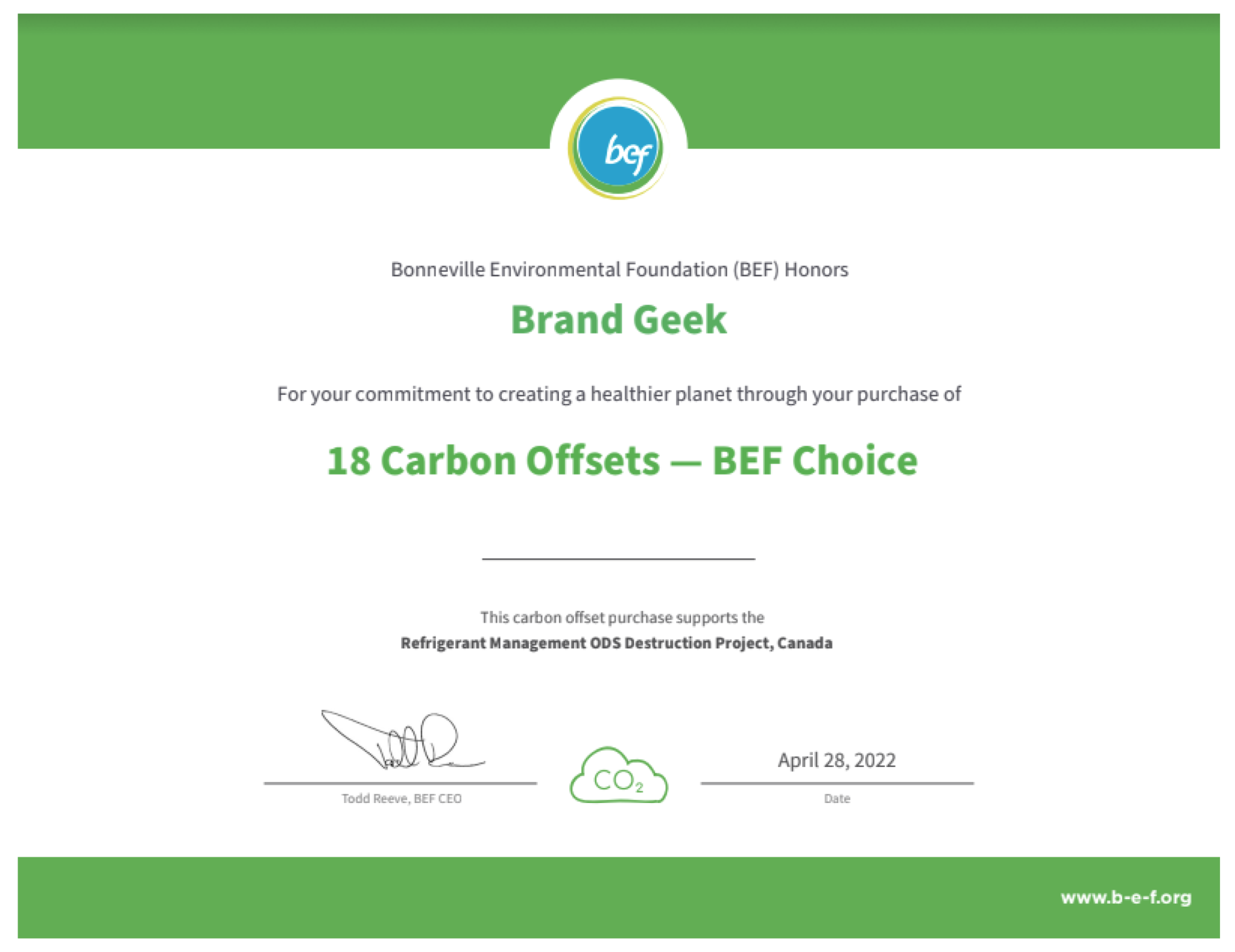Brandgeek proudly supports Mountain Area Preservation and is humbled to be…
Geekview IP Weeks(ish) in Review
Something about this stinks!
Sean Combs is a man of many hats. And just as many names: Puff Daddy, Puff, Puffy, P.Diddy, Diddy & Sean John. Who can keep track of them all? Or other people’s trademarks, for that matter? Diddy’s company — Christian Casey — has 28 LIVE trademark registrations and pending applications, 19 of which include SEAN JOHN. Sean himself is or was listed as the owner on 26 LIVE PTO applications and registrations. When Diddy and his crew failed to win the favor of the Empress (Empress Hair Care that is, which owns the federally registered mark EMPRESS for hair care products), they chose to ignore her. Diddy and his gang started selling EMPRESS SEAN JOHN even though their request to Empress, as well as their intent to use trademark registration application for EMPRESS SEAN JOHN were rejected based the EMPRESS registration. Feeling slighted, the Empress fought back by filing (and soon amending) a lawsuit for trademark infringement and unfair competition, which claims that actual consumer confusion has occurred. Is that confusion helping or hurting, I wonder while also wondering who would pay to drink black water?
Creative Thinkers allege not-so-creative theft of black water.
The lawsuit begins, “This case combines international theft with reality television.” What could be better, besides maybe a reality television show about international theft? Creative Thinkers claims to have (and I am quoting here) “created the concept and idea of the ‘better mousetrap’ of water drinks when it developed the idea of infusing water with fulvic acid and humic acid and marketing it as BLACKWATER.” Most people think of Blackwater as the brand beloved for controversial private security contracts with the US Government, right? Maintaining the worldwide drama (only this time between the US and Canada), the Blackwater water trademark suit alleges that defendants “have breached their agreements, broken their promises, and repeatedly committed fraud and deception in their television-supported attempt to wrongfully confiscate the very concept and name of BLACKWATER. Defendants have used their purported reality TV show fame (Real Housewives of New Jersey) to concoct a fairy tale fiction as to how they conceived the idea behind BLACKWATER . . . Defendants simply stole it.” And by it they mean the BLACKWATER, or blk. brand and concept, which still seems like a very strange brand to be fighting over, no matter what the product. And in other high profile IP international intrigue . . .
Infringement Extradition! A British chap named Richard O’Dwyer probably wishes there wasn’t a Wikipedia entry about him. The entry describes a teenage college kid whom a UK court recently sacrificed to the US, ordering him shipped to New York to stand trial for criminal copyright infringement. O’Dwyer faces the possibility of serving up to 10 years in US federal prison for his crimes. O’Dwyer’s website, TVShack posted links to pirated material, though it did not host any files. According to an article on The Guardian, US prosecutors’ claim O’Dwyer made £15,000 per month (roughly $23,000.00) in advertising revenue. Nonetheless, is running a website from and in the UK enough to establish purposeful availment for extradition to the US under the UK Extradition Act of 2003? Especially when the only UK prosecution of a similar case — against TV-Links — got thrown out last year according to another article on The Guardian. Seems like if anything, this kid should stand trial in the UK, which could even apply US law if appropriate (which I doubt it is if all the activity occurred in the UK). Copyright infringement extradition seems like something you’d see in the movies, hopefully lawfully broadcast. In real life, we see stars bearing bling linked to lawsuits . . .
A British chap named Richard O’Dwyer probably wishes there wasn’t a Wikipedia entry about him. The entry describes a teenage college kid whom a UK court recently sacrificed to the US, ordering him shipped to New York to stand trial for criminal copyright infringement. O’Dwyer faces the possibility of serving up to 10 years in US federal prison for his crimes. O’Dwyer’s website, TVShack posted links to pirated material, though it did not host any files. According to an article on The Guardian, US prosecutors’ claim O’Dwyer made £15,000 per month (roughly $23,000.00) in advertising revenue. Nonetheless, is running a website from and in the UK enough to establish purposeful availment for extradition to the US under the UK Extradition Act of 2003? Especially when the only UK prosecution of a similar case — against TV-Links — got thrown out last year according to another article on The Guardian. Seems like if anything, this kid should stand trial in the UK, which could even apply US law if appropriate (which I doubt it is if all the activity occurred in the UK). Copyright infringement extradition seems like something you’d see in the movies, hopefully lawfully broadcast. In real life, we see stars bearing bling linked to lawsuits . . .
Sham Shamballa sellers served suit.
Shamballa Jewels crafts luxury jewelry. It is sold in department stores like Barney’s and Neiman Marcus, worn by celebrities like Jay-Z, Michael Jordan, Demi Moore, Gwyneth Paltrow and Ozzy & Sharon Osbourne and featured in Vogue, InStyle, Elle, Essence, Esquire among others. Shamballa recently sued 3 online stores: Bling Jewelry, EJeweler and Overstockjeweler.com, along with Elana Castaneda, who Shamballa says controls one or more of the corporate defendants. The lawsuit claims that these defendants engaged in false advertising and unfair competition by using the SHAMBALLA mark with jewelry that “bears a striking resemblance to the SHAMBALLA Bracelet Designs.” Common law rights in the arbitrary SHAMBALLA mark seem very strong, but I question what rights exist in the “SHAMBALLA Bracelet Designs.” My hunch is the jewelry design isn’t protectable under copyright or trademark law due to functionality and failure to function as a mark, which is why it was mentioned, but not really pled. Meanwhile, in other thought-provoking news, Ron Paul was caused to pause over political ads falsely implying his endorsement . . .
Ron Paul sues over Manchurian Candidate.
Ron Paul filed a lawsuit against John Does 1-10 for false designation of origin, false advertising, libel and defamation. While the defendants themselves are unknown to Paul and his team of lawyers, the negative effect of their actions are all too familiar. On January 4, 2012 Defendants, operating under the name NHLiberty4Paul uploaded a YouTube video called Jon Huntsman’s Values. The video compares Hunstman to the fictional Manchurian Candidate who’s captured by the Chinese and brainwashed into becoming a political assassin. Paul claims the ads are as much an attack on him as they are on Huntsman, as much of the press coverage and public commentary about the video has been “scathingly negative” towards Paul. Paul seeks treble and punitive damages, attorneys’ fees and costs, restitution and an injunction preventing the defendants from implying any connection to Paul. Paul may not win the Republican Presidential primary, but I think he’s bound to win this suit. While Ron Paul may have fallen prey to a den of wolves, the Wolf Trap Foundation for the Performing Arts has set its sights on the Barns of Rose Hill . . .
Wolf Trap seeks to capture infringing barn bounty.
Wolf Trap is America’s National Park for the Performing Arts, which is operated by the Congressionally-created non-profit Wolf Trap Foundation for the Performing Arts. Its Mission is to “To present and create excellent and innovative performing arts programs for the enrichment, education, and enjoyment of diverse audiences and participants.” THE BARNS AT WOLF TRAP trademark has been in use for “entertainment services, namely, the operation of a theatre for presenting entertainment events for the public” since at least as early as October 31, 1981 and has been federally registered since October 23, 2001. The USPTO required evidence of acquired distinctiveness (brand recognition) for the term WOLF TRAP, which indicates that the dominant feature in THE BARNS AT WOLF TRAP is THE BARNS. A mere 2 counties away, the well intentioned art loving community of Rose Hill re-purposed two old dairy barns to house their community arts and education center, calling it THE BARNS AT ROSE HILL. How this ended up in court is a mystery to me, even with Wolf Trap’s clearly superior legal position. According to an article on Clarke Daily News, the Wolf Trap foundation initially was unresponsive to Rose Hill’s requests for a meeting, but now that the case is being scrutinized in the media settlement discussions are scheduled. Once again lawyers who forget how to play nice (even when requiring another party to cease and desist) reflect poorly on their clients. Lawyers aren’t the only ones who don’t always play nice . . .
Mega calls Lego’s latest move blockheaded.
Mega makes Mega Bloks, plastic inter lockable building blocks, similar to those made by Lego. According to an article on Bizmology, itself citing a recent article on the Winnipeg Free Press, Mega Brands has prevailed in around 15 cases brought against it by Lego around the world, including one in Canada. The latest round of legal wrangling is taking place in the press and in a federal court case filed against Lego by Mega in California. Mega seeks to cancel Lego’s trademark registration, and also seeks declaratory judgment of non-infringement and a ruling against Lego for violation of antitrust laws as a result of Lego’s recent attempt to get US Customs and Border Protection to restrict the importation of certain MEGA products, which have been sold in the US for 20 years. Lego/Mega round 16 starts now.
 Some cases really make me scratch my head. Why adopt a mark that’s likely to have problems, no matter how much you like it? Why run into court when your opponent offers to discuss the matter with you? How do so many of the cases I write about get as far as they do and could it be different?
Some cases really make me scratch my head. Why adopt a mark that’s likely to have problems, no matter how much you like it? Why run into court when your opponent offers to discuss the matter with you? How do so many of the cases I write about get as far as they do and could it be different?











RE: Wolf Trap Foundation v. Barns of Rose Hill
The Barns of Rose Hill has been here for over 100 years and commonly referred to as such. Tha barns, an old mansion & land was donated to the town in 1964. Wolf Trap was not founded until the 1970’s and their barns were not imported to their site until 1981. Clearly on their own social media sites not many people are familiar with The Barns at Wolf Trap. Personally, in my 15 years of being in Northern Va, I have yet to see an ad for them only for Wolf Trap. I have never seen and they have not produced ANY ads stating “The Barns” which is what their trademark application is for. The one posted in their application is not an ad. It is a single page brochure. There is no direct web site for them. BarnsofRoseHill.org has existed for years. Open public fundraising has been existing for 48 years. How is this so clear to you? To the rest of the world, it is crystal clear Wolf Trap cannot coin the commkon every day words “The Barns”. Their application has NOT been approved. Do a “google” search and you will see tons of places called “The Barns”.
Thanks for reading and commenting on my post, Richie. Sorry for my delayed response, but I thought it more important to respond thoroughly rather than hastily.
You state that The Barns of Rose Hill has been in existence for over 100 years. While that may be true of the physical structures, my understanding is that Rose Hill’s use of THE BARNS OF ROSE HILL brand for entertainment services is relatively recent and subsequent to use of THE BARNS AT WOLF TRAP for identical services (please correct me if I am wrong). Further, Wolf Trap Foundation owns an incontestable federal service mark registration for THE BARNS AT WOLF TRAP for entertainment services. Although Wolf Trap’s federal trademark registration application for THE BARNS remains pending, its rights in THE BARNS AT WOLF TRAP are prior or superior to those in THE BARNS AT ROSE HILL for identical services. THE BARNS is the dominant portion of the THE BARNS AT WOLF TRAP mark and the Wolf Trap Foundation had to prove that it acquired distinctiveness (aka brand recognition) in the geographically descriptive term WOLF TRAP through its longstanding use of that term.
I easily found evidence of service mark use of THE BARNS AT WOLF TRAP on Wolf Trap’s website: THE BARNS AT WOLF TRAP may not be the most prominent mark on the Wolf Trap website, but use of the mark on the event calendar is sufficient to acquire service mark rights therein. Brand owners need not promote each mark via a separate ad or website (imagine how many websites big brand owners like Nike or Facebook would have to have, were that the case!); a single page brochure, or a website page (or even a portion thereof) is a sufficient basis on which to acquire service mark rights.
If Barns at Rose Hill has existed for years, the Rose Hill organization may be able to assert the legal defense of acquiescence and/or estoppel, if it can prove that Wolf Trap knew about Rose Hill’s use of THE BARNS AT ROSE HILL for entertainment services for years and did nothing about it. However, if the THE BARNS AT ROSE HILL website and mark were used solely for fundraising services, then such use doesn’t help Rose Hill in the current dispute with Wolf Trap, since Wolf Trap’s complaint concerns use of THE BARNS AT ROSE HILL for entertainment services, not for fundraising services. Again, you have to keep in mind that trademark rights are relative to the specific goods and services on or in connection with which the mark is used. Hence the existence of The Barns at Rose Hill as physical structures and/or use of THE BARNS AT ROSE HILL for fundraising services is irrelevant to the entertainment services infringement analysis, only use of the THE BARNS OF ROSE HILL for entertainment services is relevant.
The courts examine the following factors when determining whether infringement (consumer confusion) is likely:
(1) Similarity of marks and overall commercial impression (sight, sound & meaning trilogy)
(2) Relatedness of goods/services
(3) Similarity of channels of trade
(4) Impulse purchase v considered purchase
(5) Fame of the prior mark
(6) Number and nature of similar marks for similar goods/services
(7) Nature and extent of any actual confusion.
(8) Concurrent use without actual confusion
(9) Variety of goods on which a mark is used
(10) Market interaction between prior (1st) and junior trademark user
(11) Extent of exclusive rights of prior user
(12) Extent of potential confusion
(13) Any other established probative fact
When the first two factors favor one party, that is usually enough for that party to win. In this case, the dominant portion of the marks — THE BARNS — is identical, as are the services. I just don’t see how Rose Hill comes out ahead on these facts (unless it can prove Wolf Trap waited too long to assert its rights in relation to Rose Hill’s use of THE BARNS for entertainment services, which does not appear to be the case).
I’m sure this isn’t what you want to hear, but I hope it helps you understand my opinion of the case.
Please feel free to respond to this comment if you have additional questions or comments and thanks again for making the time to reach out to me.
The case settled with The Barns at Rose Hill agreeing to:
(1) Omit the word “The” from its name so it will be known as Barns at Rose Hill
(2) No longer reference its service area as “Northern Virginia,” but instead refer to it as the “Shenandoah Valley.”
(3) Refrain from Opposing Wolf Trap’s federal trademark registration application for THE BARNS for entertainment services.
(2) and (3) make sense to me but (1) . . .
I know I said that this seemed to be a case of lawyers getting in the way insofar as the approach taken to resolve the dispute, but where were the lawyers when Wolf Trap needed them to resolve the dispute?
How do you get from:
We’re concerned that people will mistakenly believe our organizations are related due to the similarity in our marks.
to . . .
Just drop the ‘The’ in your mark and everyone will be able to differentiate between us.
THE BARNS AT WOLF TRAP / BARNS AT ROSE HILL
Yup, that clears up everything!
I presume the parties will include a provision to revisit the issue if either experiences consumer confusion, which still seems highly likely given the minor changes to Rose Hill’s mark. Although, perhaps as Richie says, no one knows about Wolf Trap’s BARNS mark, in which case no one should be confused. Except me.
http://www.clarkedailynews.com/breaking-news-on-the-barns-of-rose-hill/28927